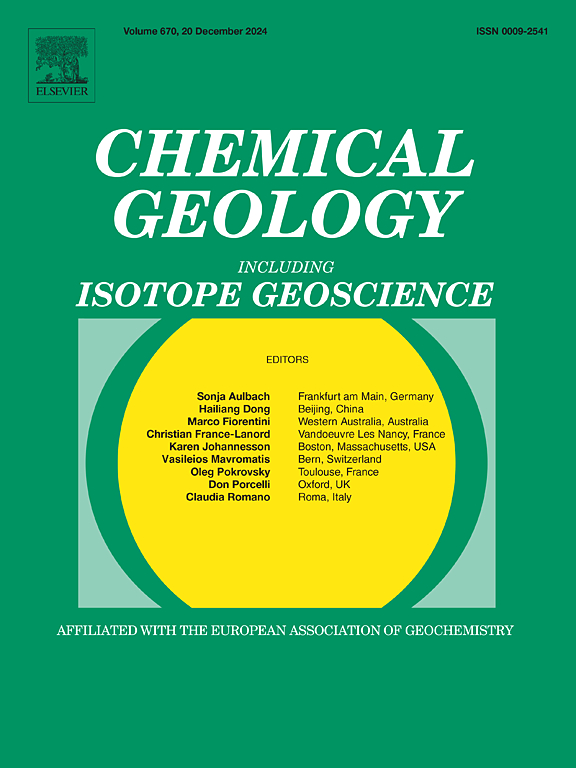Apatite and Zircon as key indicators for effusive-explosive transition in the Leningcou Volcano: Middle Triassic Volcanic activity in the East Kunlun Orogenic Belt
IF 3.6
2区 地球科学
Q1 GEOCHEMISTRY & GEOPHYSICS
引用次数: 0
Abstract
Volcanic eruptions play a critical role in the Earth's system by linking the lithosphere, atmosphere, hydrosphere, and biosphere. Determining the mode of volcanic eruptions is essential for assessing the potential hazards posed by volcanic activity to humans. Although significant progress has been made in monitoring active volcanoes and analyzing them with modern techniques, our understanding of the effusive-explosive transition in ancient volcanic eruptions remains limited. This study focuses on the Leningcou ancient volcano in the Triassic Chachaxiangka area of the East Kunlun Orogenic Belt on the northern Tibet Plateau. It aims to investigate the products around the ancient volcanic caldera through the study of accessory minerals and to identify potential factors influencing the effusive-explosive transition in volcanic eruptions.
Our research reveals that the Leningcou ancient volcano is composed of intermediate to acidic pyroclastic rocks and lava, with lava mainly exposed in the center of the ancient crater. Zircon U-Pb dating results indicate that this volcano was active during the Middle Triassic, approximately 242 Ma. Combined with whole-rock Sr-Nd isotopes and apatite Nd isotopic analysis, we suggest that the volcanic products originate from a similar crust-mantle mix source region and experienced varying degrees of crustal contamination. Using apatite hygrometers, we calculated the water content of the melts from the volcanic crater products, finding similar values with an average ranging between 3.3 and 3.7 wt% for both effusive and explosive volcanic rocks. The water content in the rhyolite melt of effusive eruptions reaches the highest value of 3.7 wt%. By analyzing redox-sensitive elements in apatite and zircon, we found that rhyolitic melts from explosive eruptions exhibit lower oxygen fugacity (ΔFMQ <0), whereas the andesitic and rhyolitic melts of effusive eruptions show higher oxygen fugacity (ΔFMQ >1).
Our research proposes a new model suggesting that a recharge event of mafic magma in the shallow crustal magma reservoir reactivated the crystal mush and triggered explosive eruptions. Higher melt water content introduced by new magma, along with a more open magma reservoir, are often key to factors in the transition from effusive to explosive eruptions.
磷灰石和锆石是列宁沟火山涌出-爆炸转变的关键标志:东昆仑造山带中三叠世火山活动
火山喷发通过连接岩石圈、大气、水圈和生物圈,在地球系统中起着至关重要的作用。确定火山喷发模式对于评估火山活动对人类造成的潜在危害至关重要。尽管在监测活火山和用现代技术分析活火山方面取得了重大进展,但我们对古代火山爆发中渗出-爆炸转变的了解仍然有限。本文以青藏高原北部东昆仑造山带三叠系察察乡卡地区的列宁沟古火山为研究对象。其目的是通过对古火山口周围副矿物的研究,研究古火山口周围的产物,识别火山喷发中影响喷涌-爆炸转变的潜在因素。研究表明,列宁沟古火山由中酸性火山碎屑岩和熔岩组成,熔岩主要暴露在古火山口中心。锆石U-Pb测年结果表明,该火山活动于中三叠世,约242 Ma。结合全岩Sr-Nd同位素和磷灰石Nd同位素分析,认为火山产物起源于相似的壳幔混合源区,并经历了不同程度的地壳污染。利用磷灰石湿度计,我们计算了火山口产物中熔体的含水量,发现喷涌和爆炸火山岩的平均含水量在3.3 - 3.7 wt%之间。喷涌喷发流纹岩熔体含水量最高,为3.7 wt%。通过对磷灰石和锆石氧化还原敏感元素的分析,发现爆炸喷发流纹岩熔体氧逸度较低(ΔFMQ <0),而喷涌喷发安山岩和流纹岩熔体氧逸度较高(ΔFMQ >1)。我们的研究提出了一个新的模型,认为浅层地壳岩浆库中基性岩浆的一次补给事件重新激活了结晶糊状物并引发了爆炸喷发。新岩浆带来的更高的熔融水含量,以及更开放的岩浆储层,往往是从喷涌喷发到爆发性喷发转变的关键因素。
本文章由计算机程序翻译,如有差异,请以英文原文为准。
求助全文
约1分钟内获得全文
求助全文
来源期刊

Chemical Geology
地学-地球化学与地球物理
CiteScore
7.20
自引率
10.30%
发文量
374
审稿时长
3.6 months
期刊介绍:
Chemical Geology is an international journal that publishes original research papers on isotopic and elemental geochemistry, geochronology and cosmochemistry.
The Journal focuses on chemical processes in igneous, metamorphic, and sedimentary petrology, low- and high-temperature aqueous solutions, biogeochemistry, the environment and cosmochemistry.
Papers that are field, experimentally, or computationally based are appropriate if they are of broad international interest. The Journal generally does not publish papers that are primarily of regional or local interest, or which are primarily focused on remediation and applied geochemistry.
The Journal also welcomes innovative papers dealing with significant analytical advances that are of wide interest in the community and extend significantly beyond the scope of what would be included in the methods section of a standard research paper.
 求助内容:
求助内容: 应助结果提醒方式:
应助结果提醒方式:


